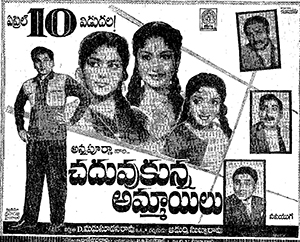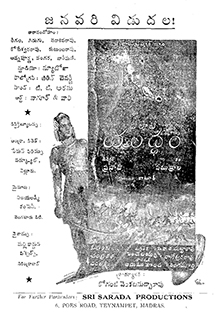I. V. Subba Rao may refer to:
I. V. Subba Rao may refer to:

Yellapragada Subba Rao was a pioneering Indian biochemist who discovered the function of adenosine triphosphate (ATP) as an energy source in the cell, developed methotrexate for the treatment of cancer and led the department at Lederle laboratories in which Benjamin Minge Duggar discovered chlortetracycline (Aureomycin) in 1945.

Mantri Gari Viyyankudu s a 1983 Telugu-language film released directed by Bapu and stars Chiranjeevi in the lead role and Poornima Jayaram, Nirmalamma and Allu Ramalingaiah in important roles.
Subba may refer to:
Subbarao or Subba Rao, sometimes spelled SubbaRow or Subba Row, is an Indian name.
Kakarla Subba Rao was an Indian radiologist who served as the first director of Nizam's Institute of Medical Sciences, Hyderabad. For his contributions to the field of medicine, Rao was conferred Padma Shri in 2000, the fourth highest civilian award by the Government of India. He was also the founder and president of the Telugu Association of North America.
The National Pledge is an oath of allegiance to the Republic of India. It is commonly recited by Indians in unison at public events, especially in schools, and during the Independence Day and Republic Day celebrations. It is commonly found printed in the opening pages of school textbooks and calendars. It is recited in the morning assembly of most Indian schools. However, the pledge is not part of the Indian Constitution.

Koka Subba Rao was the ninth Chief Justice of India (1966–1967). He also served as the Chief Justice of the Andhra Pradesh High Court.

Adurthi Subba Rao was an Indian film director, cinematographer, screenwriter, editor and producer known for his works predominantly in Telugu cinema. Rao is widely regarded as the intellectual fountain head of Indian drama films. He has garnered seven National Film Awards. Rao made his foray into cinema as Associate to Uday Shankar in the 1948 dance film Kalpana, which was showcased in the "Treasures from National Film Archive of India" at the 39th International Film Festival of India. The 1960 film Nammina Bantu was a work of drama in the broader sense achieved by means of actors who represented mimesis throughout the narrative. The film was simultaneously shot in Tamil as Pattaliyin Vetri. Upon release both versions received critical acclaim. The Telugu work was screened at the San Sebastián International Film Festival. The film also won the National Film Award for Best Feature Film in Telugu for that year.

Chaduvukunna Ammayilu is a 1963 Indian Telugu-language drama film, produced by D. Madhusudhana Rao under the Annapurna Pictures banner and directed by Adurthi Subba Rao. It stars Akkineni Nageswara Rao, Savitri, Krishna Kumari and music composed by S. Rajeswara Rao. The film is based on the Telugu novel Kaalaatheetha Vyakthulu, written by Dr. Sridevi. The film was recorded as a Super Hit at the box office.

Thodi Kodallu (transl. Daughters-in-law) is a 1957 Indian Telugu-language drama film directed and edited by Adurthi Subba Rao who co-wrote the script with D. Madhusudhana Rao and Acharya Aatreya. Madhusudhana Rao produced the film under Annapurna Pictures. It stars Savitri and Akkineni Nageswara Rao with music composed by Master Venu. The film is based on Sarat Chandra Chattopadhyay's Bengali novel Nishkriti, and was simultaneously made as the Tamil film Engal Veettu Mahalakshmi (1957); both films were made simultaneously by the same banner and director, and some of the scenes and artists are the same in both versions. Thodi Kodallu won the Certificate of merit for Best Feature Film in Telugu.
Bugata Venkata Subba Rao, better known as B. A. Subba Rao, was a Telugu film producer and director. He is recipient of Raghupathi Venkaiah Award for his lifetime contribution of Telugu cinema and one Filmfare Award.

Bhishma is a 1962 Indian Telugu-language Hindu mythological film, based on the life of Bhishma from the epic Mahabharata, produced and directed by B. A. Subba Rao. It stars N. T. Rama Rao and Anjali Devi, with music composed by S. Rajeswara Rao.

Palnati Yuddham is a 1947 Indian Telugu-language historical war film jointly directed by L. V. Prasad and Gudavalli Ramabrahmam. Based on the Battle of Palnadu, the film stars Akkineni Nageswara Rao, Govindarajula Subba Rao and Kannamba, with music composed by Galipenchala Narasimha Rao. It is produced by Koganti Venkata Subba Rao under the Sri Sarada Productions banner.
Idupuganti Venkata Subba Rao M.Sc. Ph.D. was an eminent Agricultural scientist.
K. S. Rao may refer to:

Vivaha Bhojanambu is a 1988 Telugu-language comedy film directed by Jandhyala who co-produced the film with Jaya Krishna under the J. J. Movies banner. It stars Rajendra Prasad, Chandra Mohan, and Ashwini with music composed by S. P. Balasubrahmanyam. The film's title is the song from the 1957 Telugu film Mayabazar. The original song and its video played during the credits. The film was successful at the box office.

Maro Prapancham is a 1970 Telugu-language film, produced by Akkineni Nageswara Rao and Adurthi Subba Rao under the Chakravarthy Chitra banner and directed by Adurthi Subba Rao. It stars Akkineni Nageswara Rao, Savitri, Jamuna and music composed by K. V. Mahadevan.

Second Hand is a 2013 Indian Telugu-language romantic drama starring Dhanya Balakrishna, Sudheer Varma, Kireeti Damaraju, Sree Vishnu and Anuj Ram. This film marks the debut of writer B. V. S. Ravi as a co-producer and Telugu debut of director Kishore Tirumala. Avaneedra, who previously worked for the Hindi film Bhoot Returns (2012), and Uma Shankar were the cinematographers for the film.

Bokinakere Ramakrishnaiya Subba Rao was an Indian-origin entomologist who worked at the Commonwealth Institute of Entomology. He was a specialist on biological control and described many species of parasitic wasps including Neodusmetia sangwani which is considered one of the most successful examples of classical biological control. Rao also served as a linesman and umpire at Wimbledon from 1969 to 1995.

Nanjanagud Subbaraya Subba Rao was a professor of economics at Maharaja College, Mysore. He later became Principal of Maharaja College, Mysore and retired as the Vice Chancellor of University of Mysore from 1937 - 42. Subba Rao was a student of Alfred Marshall at Saint John's College, Cambridge, between 1905 and 1909 where he completed his M. A. Tripos exam and Bar-at-Law qualification. N. S. Subba Rao was a contemporary of John Maynard Keynes and Arthur Cecil Pigou and had a close working relationship with both of them for nearly two decades. Among the prominent contributions of N. S. Subba Rao are The Scouts and Guides Movement, Mysore University Co-operative Society, establishment of University and Central Libraries, Taxation Reforms both at Central and State level, Educational Reforms in the form of instituting Kannada medium of instruction in high schools, Founding of the first modern Yoga School at Mysore, Economic Reforms through his contributions at the London Round Table Conference (1930–32) along with Sir Mirza Ismail leading to the eventual formulation of the 'Indian Constitution Act' (1935) and lastly in the recruitment of future literary scholars and writers like M. Hiriyanna, G. P. Rajarathnam, S. Srikanta Sastri, Kuvempu, T. S. Venkannayya and A. R. Krishna Shastry as faculty at the nascent University.